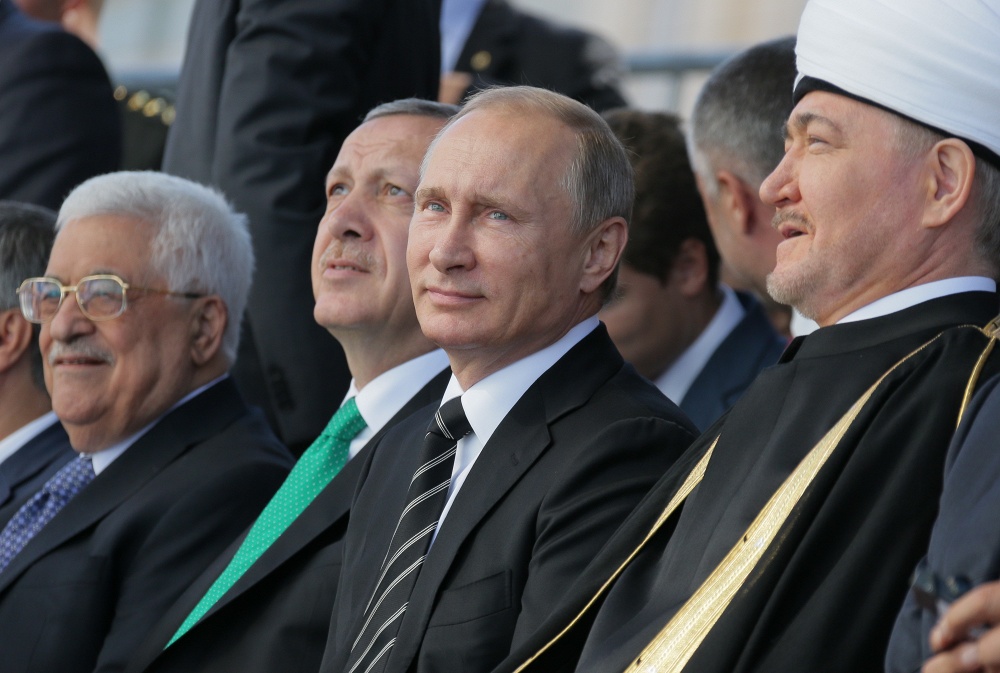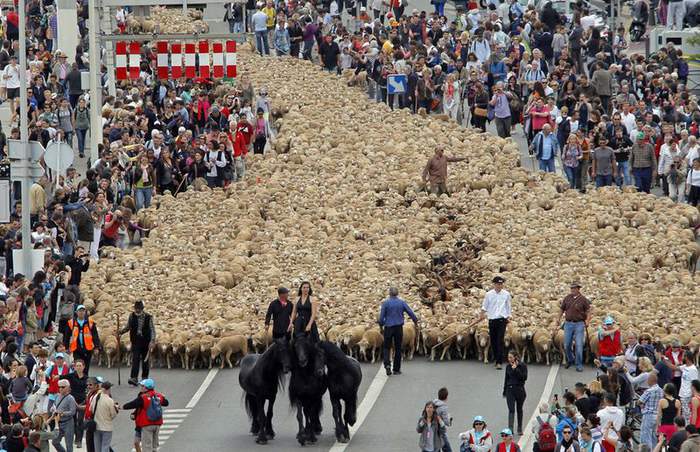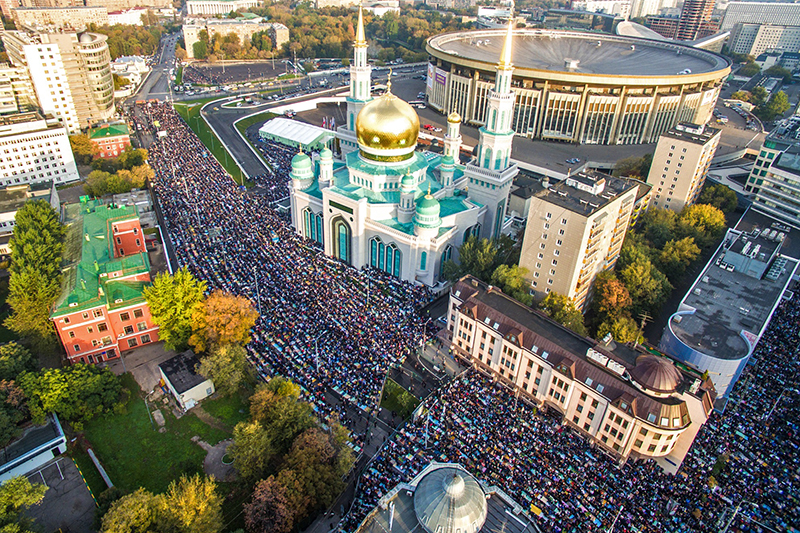Kurban Bajram is the Eastern European name for the celebration of Eid al-Adha (which means in Arabic “Feast of Sacrifice”). The holiday marks the willingness of Prophet Ibrahim to sacrifice his son Ismail for God. Muslims around the world sacrifice sheep for this holiday, giving the meat out to their family, friends and to the poor.
‘Bajram’ is a word of Turkish origin, meaning ‘festival’. Two Bajrams are celebrated each year – Ramadan Bajram and Kurban Bajram. Kurban Bajram comes two months and ten days after Ramadan Bajram and Muslims also celebrate Kurban Bajram as it marks the end of the Hajj for the millions of Muslims who make the pilgrimage to Mecca each year.
The main platform for the celebration in Moscow this year was a Grand Mosque in Vypolzov Lane, which opened a day before the holiday after a decade of reconstruction. This biggest in Europe mosque can accommodate 10,000 worshipers.
According to the press representative of the Spiritual Administration of Muslims of Russia 140 thousand people came to the temple on September 24. The holiday service was held also in four other mosques in Moscow. In addition, special areas for prayer were organized in Sokolniki Park and at the Emerald sport complex in the south of Moscow. Special tents were installed in the area Nagatinsky Zaton. The 34 sites for the celebration were also equipped in the Moscow suburbs. In 15 of them there was allowed to hold ceremonies of sacrifice.
About 6 thousand police officers, servicemen of internal troops and voluntier patrols were used to ensure public order and security in the capital.
According to the police accounts Moscow celebrations were attended by 200,000. According to the official web site of Russian Muslims, it was attended by more then two million people!
Obviously the crowds could not be accommodated in the special areas and covered a lot of Moscow streets. They were praying in the streets in the pouring rain, occupying all the roads and lawns near the mosques.
Mass prayers in the streets of Moscow once again attracted attention to the problem of shortage of mosques. The clergy say the new mosques are needed, otherwise the faithful will gather in other locations and can come under the influence of radicals.
Authorities believe that the prayer halls already built would be quite enough for Muslims of Moscow, if the crowds of migrants from Tajikistan, Azerbaijan and other Asian republics would not keep arriving at the city. Residents of the city say that they fear of the “Islamic invasion.”
The constructing of the Grand Mosque in Moscow had lasted almost 10 years and cost about 170 million rubles. The leaders of parliaments of different countries, as well as the presidents of Turkey Recep Tayyip Erdogan and Palestinian President Mahmoud Abbas were invited to the opening of the mosque.

Palestinian leader Mahmoud Abbas, Turkish President Recep Tayyip Erdogan, Russian President Vladimir Putin and Ravil Gainutdin, the chairman of the Russian Council of Muftis at the opening of the Moscow Grand Mosque.
At the opening ceremony Ravil Gainutdin, the chairman of the Russian Council of Muftis said in his speech that Russia is a “Muslim state” and the heir to the Golden Horde, a Tatar state, which conquered Russia in the Middle Ages. The announcement was made in the presence of and with reference to Russian President Vladimir Putin.
Golden Horde was one of the successor states of the empire of Genghis Khan, located on a large part of the territory of modern Russia (the Volga region, the Caucasus, Siberia). The Golden Horde adopted Islam as the state religion in 1312. Prior to that date the Horde was a part of a tolerant state with the traditional Mongolian religious elite.
The head of the Russian Council of Muftis had voiced the idea, that Russia is the “heir of the Golden Horde,” many times before, claiming that Russia was able to survive as a state only through its conquest by Tatar-Mongols and by the wise Muslim management of this part of the Golden Horde. According to the Mufti, Russians even owe the building of Orthodox churches in Moscow to Tatar Khan Uzbek (14th century). For centuries Russians consider the Battle of Kulikovo the greatest historical event that started building of the Russian state free from Tatar Yoke. Ravil Gainutdin believes that the Battle and liberation from Tatars greatly hurt Russian people. These statements, taken up by Tatar nationalists have repeatedly caused the criticism of historians, religious scholars and clerics.
0n the other hand the similar views on Russian history are often expressed by the Ukrainian nationalists, who believe that Ukraine is the real heir of the ancient Kiev Russia, while modern Russia is a logical heir of the Golden Horde with its despotism and slavery mentality.
The fact, that today such views can be expressed at an official ceremony in Moscow merits attention.



